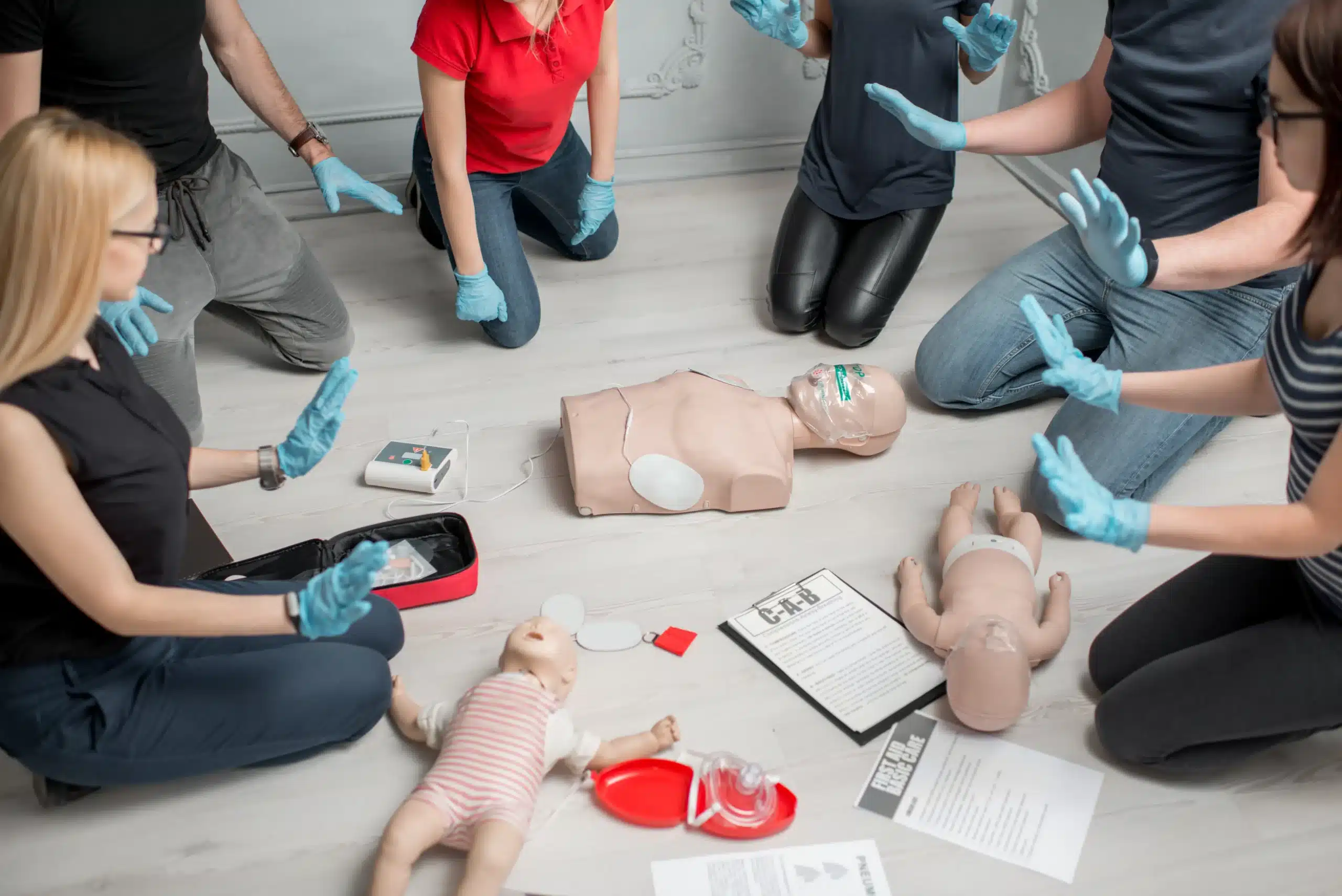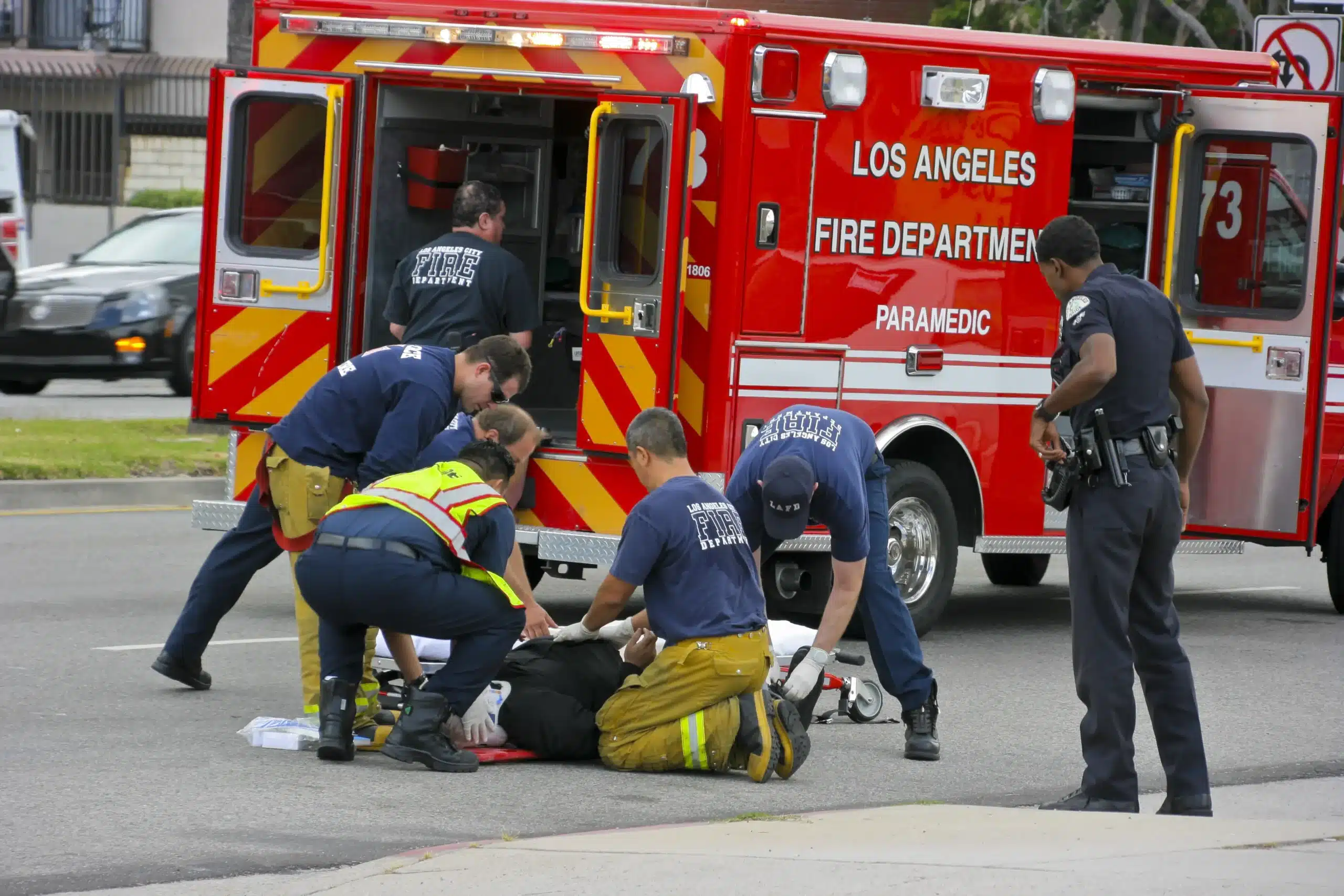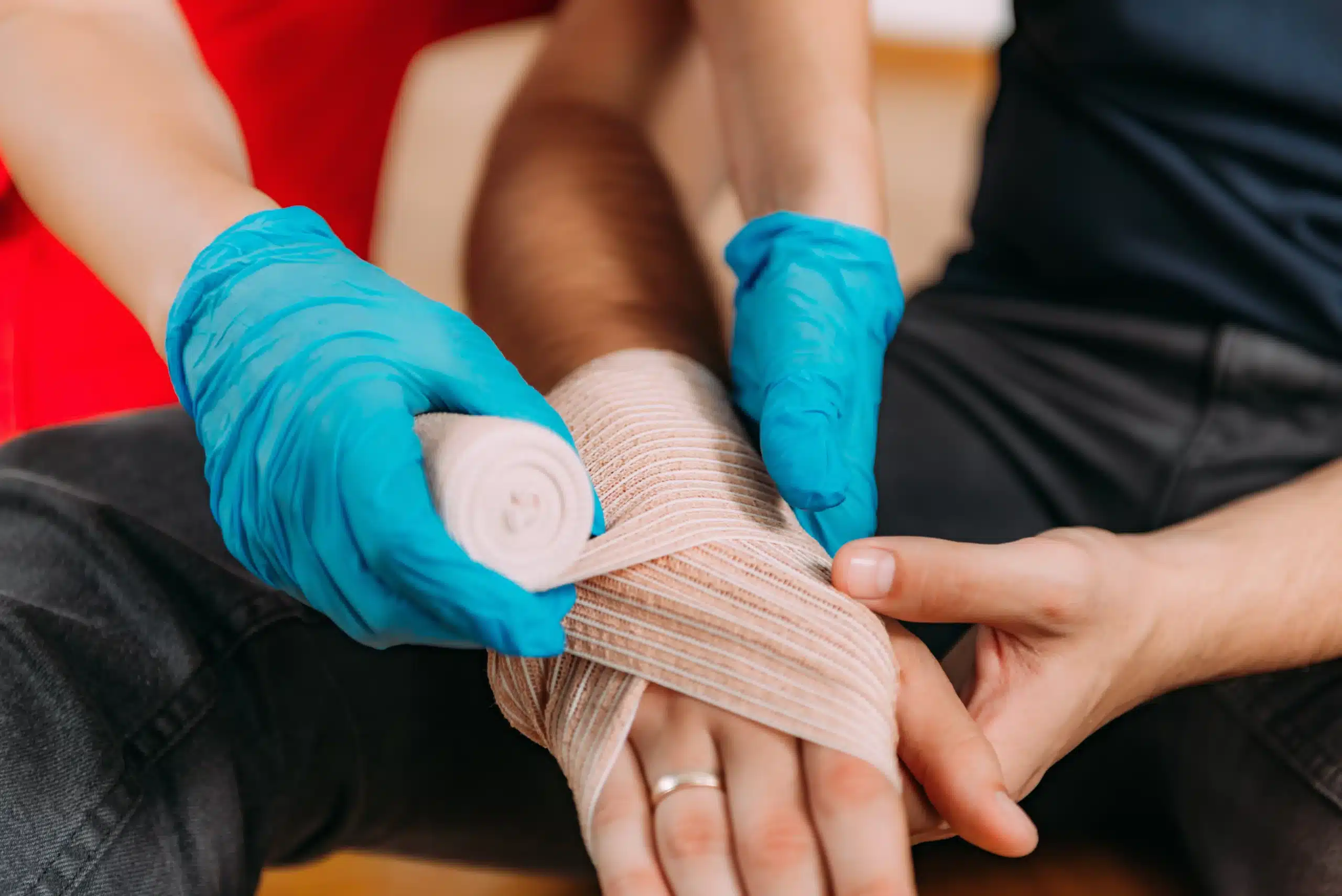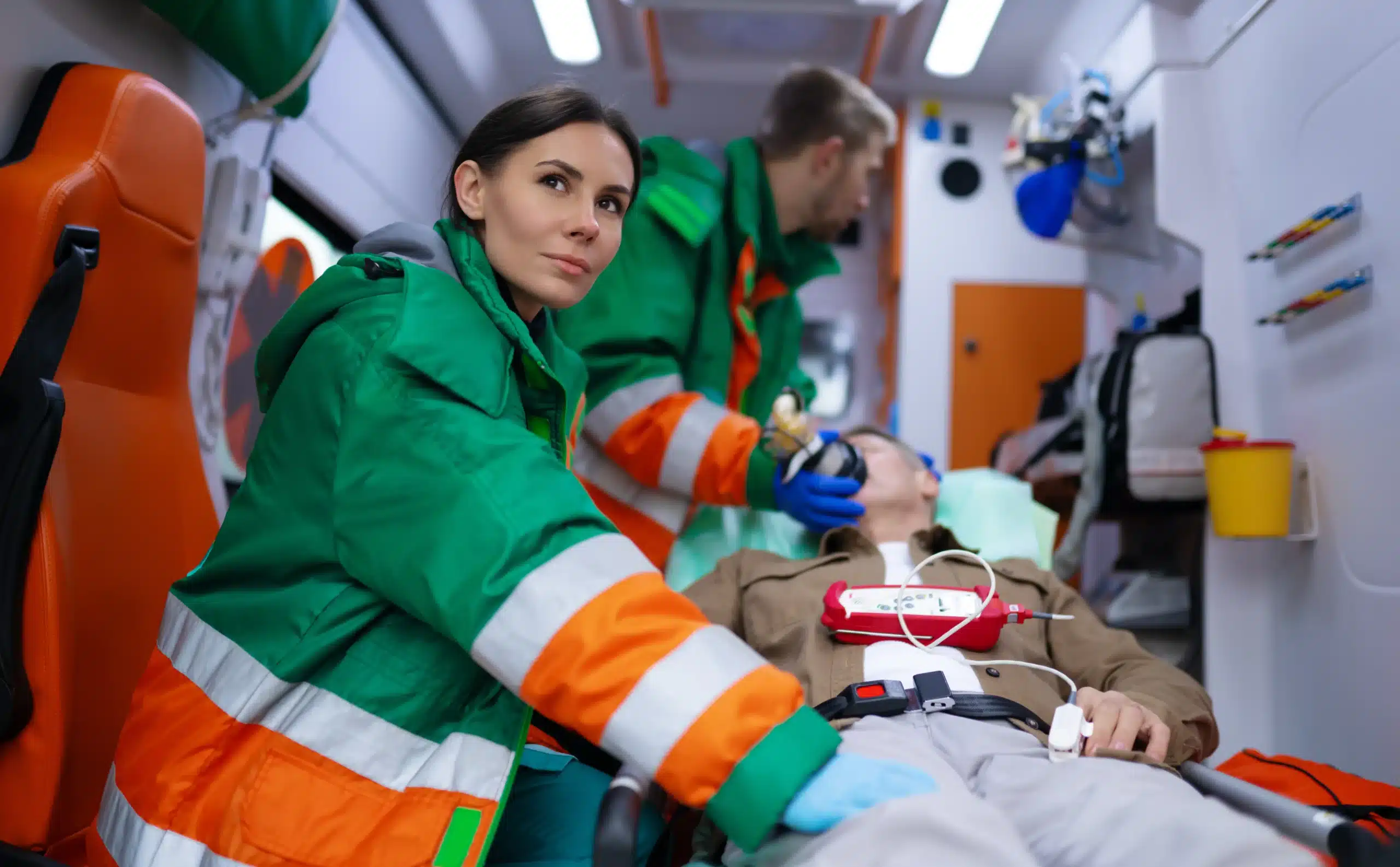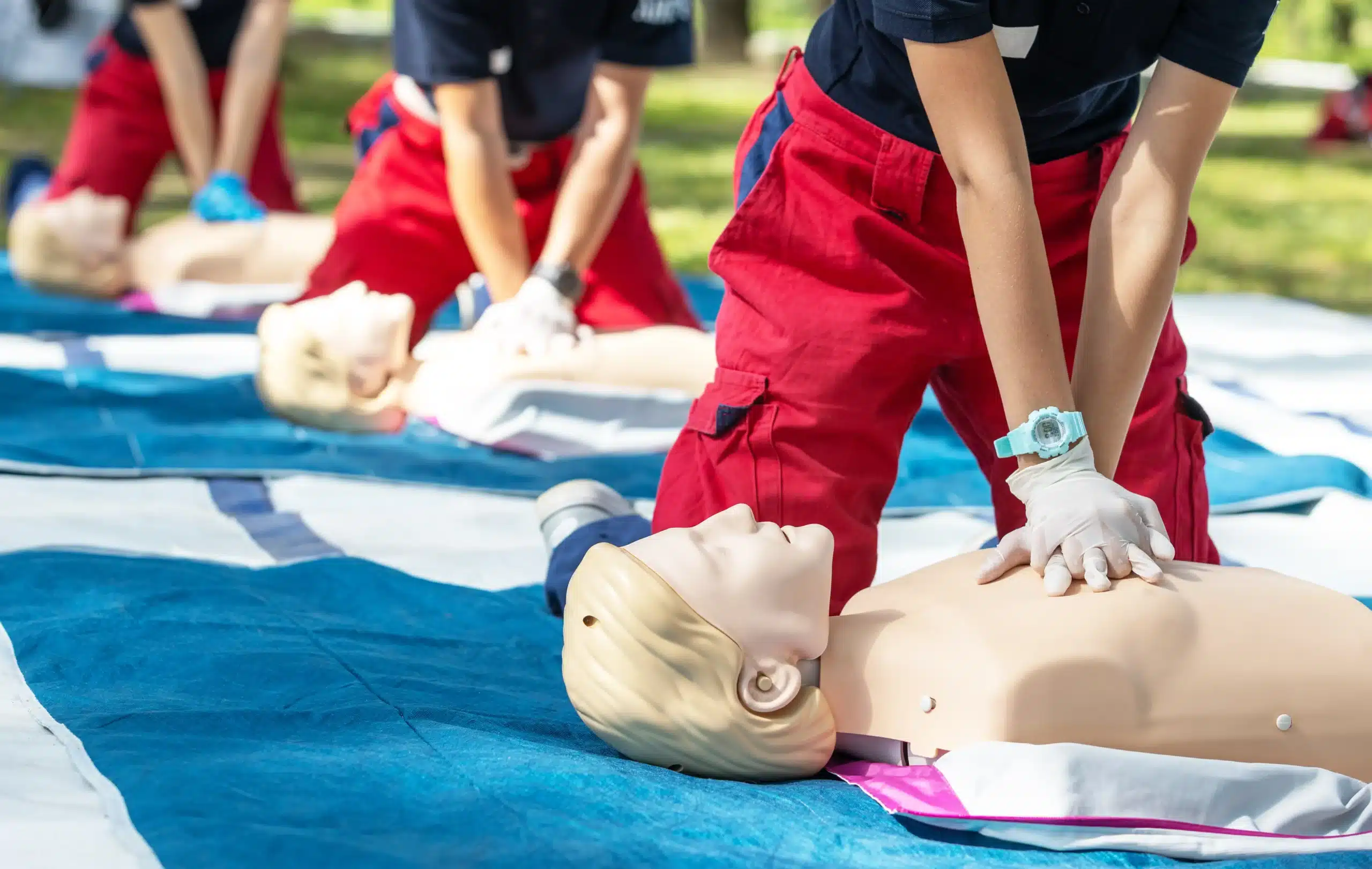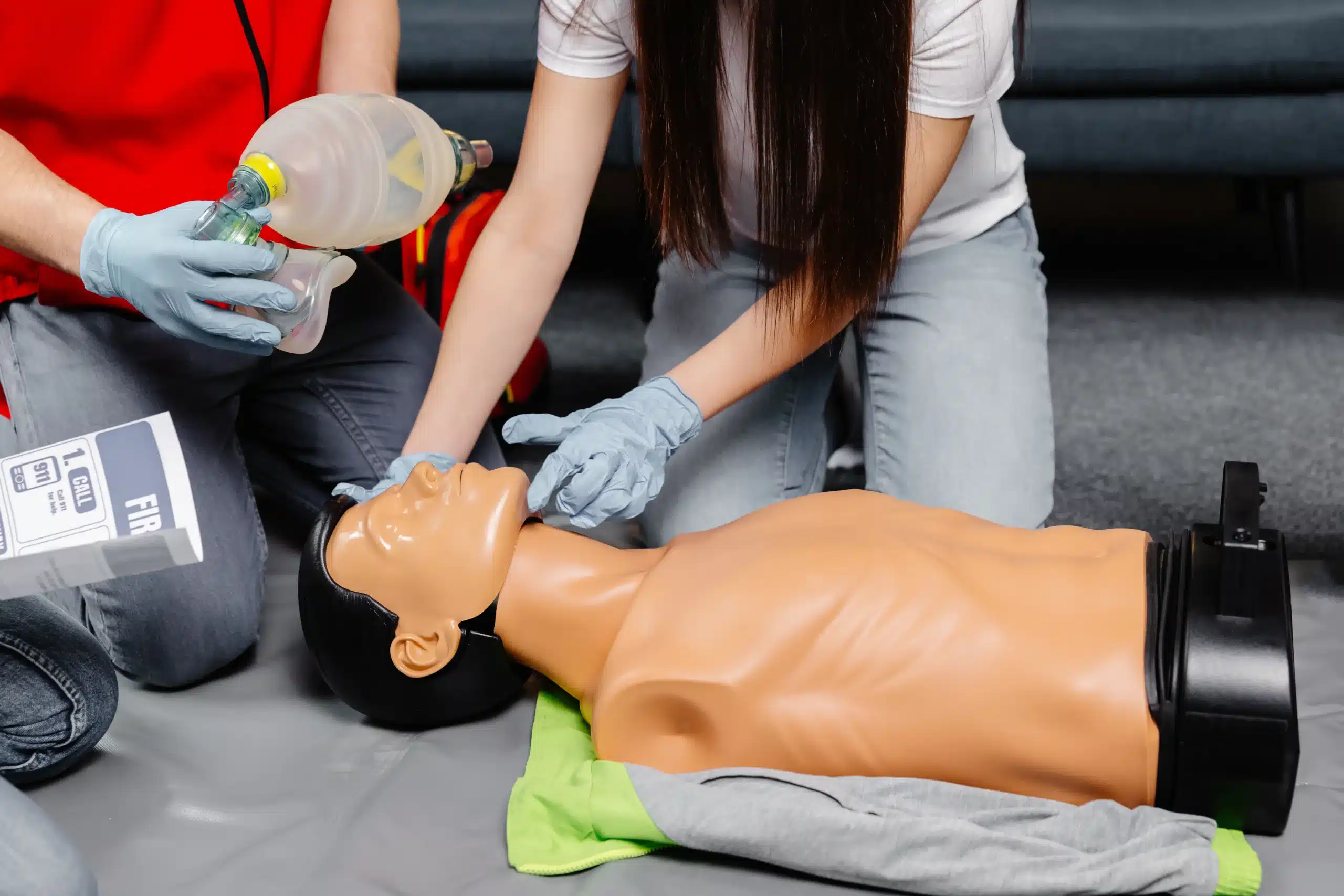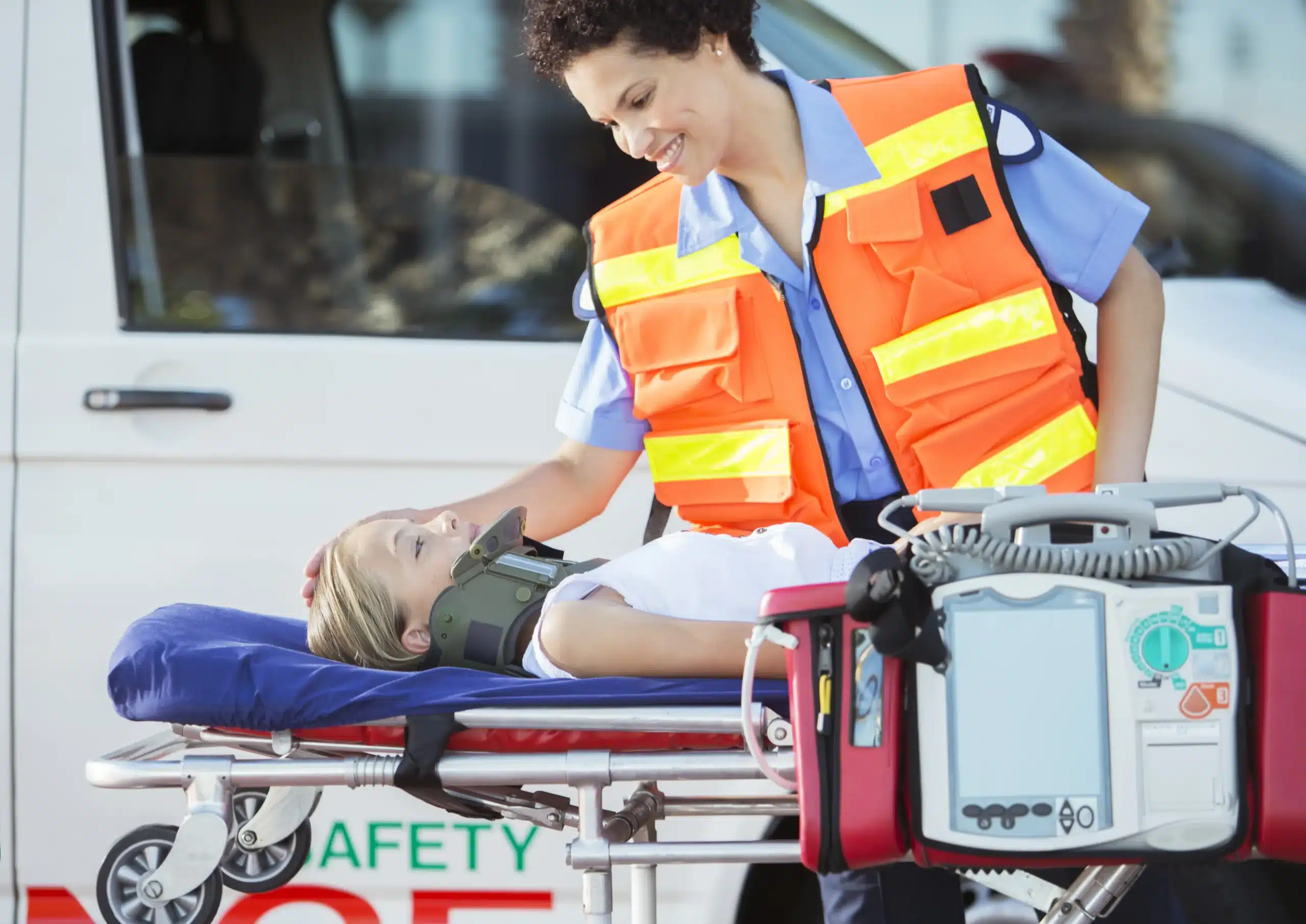Life is unpredictable. Emergencies happen. But being equipped to handle those emergencies can transform fear into action and helplessness into help. That’s the power of CPR and first-aid training. If you’re in Madera and looking to gain these life-saving skills, this guide is for you. We’ll explore the various CPR and first-aid training options available in Madera, discuss costs and scheduling, and delve into the importance of certification and ongoing skill maintenance. Get ready to become a more confident and prepared individual.
Key Takeaways
- Find the right CPR and first-aid training for you: Explore options from basic life support to specialized certifications (BLS, ACLS, PALS) based on your needs and goals. Fresno CPR Classes offers various courses with a low-price guarantee.
- Choose a training program that fits your lifestyle: Consider in-person vs. online learning, group discounts, and weekend availability. Local providers like Fresno CPR Classes and Madera CPR Classes offer convenient options.
- Stay prepared for emergencies with ongoing practice: Maintain your skills through continuing education, regular practice, and refresher courses. Resources like RQI classes and local training programs can help keep your skills sharp.
What is CPR and First Aid Training?
CPR and First Aid training gives you the skills to respond to medical emergencies. Different courses meet different needs, from the basics of life support to specialized pediatric care. Here’s a breakdown of the common types of training:
BLS
Basic Life Support (BLS) certification teaches fundamental life-saving skills, including CPR for adults, children, and infants. BLS classes also cover using an AED and working effectively as a team during resuscitation. These BLS certification courses are usually taught by healthcare professionals and give you a two-year American Heart Association certification.
ACLS
Advanced Cardiovascular Life Support (ACLS) training is designed for healthcare providers who manage cardiopulmonary arrest and other cardiovascular emergencies. This advanced training covers complex interventions and the use of medications in critical situations. ACLS certification is essential for professionals in emergency medicine.
PALS
Pediatric Advanced Life Support (PALS) focuses on the specific needs of critically ill infants and children. This course emphasizes quick assessment, effective treatment strategies, and clear communication within the medical team during pediatric emergencies. PALS training is crucial for healthcare professionals working with young patients.
First Aid Certification
First Aid training gives you a broad skill set to handle a range of emergency situations. You’ll learn to treat injuries, manage medical emergencies like allergic reactions or choking, and provide care until professional help arrives. First Aid certification is valuable for everyone, not just healthcare professionals.
Specialized Courses
Beyond the core certifications, you can find specialized courses that meet specific needs and learning styles. For example, blended learning courses combine online modules with hands-on skills practice. These specialized courses offer flexibility and personalized learning, often using interactive tools like voice-activated manikins.
Top Madera Training Providers
Finding the right CPR and first-aid training can feel overwhelming. To simplify your search, I’ve compiled a list of respected training providers in Madera. Review each option to see which best suits your needs.
Fresno CPR Classes
Fresno CPR Classes offers a wide range of American Heart Association certifications, including BLS, ACLS, and PALS. They provide a variety of options, from basic CPR to more advanced certifications. They also offer group discounts and a low-price guarantee. Learn more about their services for the Madera area on their blog.
Central Valley Medical Education
Central Valley Medical Education provides top-quality healthcare training, including BLS, ACLS, PALS, IV Therapy, and more. They offer a range of AHA-certified courses, including CPR and First Aid. Explore their course catalog and locations to find a class that fits your schedule.
Madera CPR Classes
Madera CPR Classes provides expert-led training programs for both healthcare professionals and the general public. They focus on equipping you with the skills and confidence to save lives. They offer certifications in CPR, ACLS, and other courses. Review their course catalog for a complete list of their offerings.
American Red Cross – Madera
The American Red Cross is a vital resource for Madera County, offering CPR, first aid, and other health and safety training courses through their Central Valley Chapter. Learn more about their services and impact in Madera in this overview by Fresno CPR Classes.
Madera Community College
Madera Community College may also offer CPR and first-aid training. Check their website or contact their continuing education department for more information on available courses and programs. Community colleges are often a great resource for affordable and accessible training.
Costs and Discounts
CPR and First-Aid certification costs in Madera, CA vary based on several factors. Understanding these factors will help you budget accordingly and find the best value for your training.
Average Course Prices
Online CPR classes typically range from $40 to $100. Several factors influence the final price, including the level of certification (BLS, ACLS, PALS, etc.), the format (online or blended learning), and the specific training center. For example, a Basic Life Support (BLS) certification will likely have a different price than a Pediatric Advanced Life Support (PALS) course. It’s always a good idea to check with different providers like Fresno CPR Classes for up-to-date pricing. American Heart Association BLS courses are a popular option.
Additional Fees & Materials
Beyond the course fee itself, be prepared for potential extras. Some providers may charge additional fees for materials like manuals or ebooks. For instance, a BLS class might cost $50, with an optional handbook available for an additional fee. These supplementary materials can enhance your learning, but factor them into your overall budget.
Group Discounts & Promotions
If you’re certifying a group, explore group discounts. Many training centers, including Fresno CPR Classes, offer reduced rates for organizations, businesses, or even groups of friends. This can lower the per-person cost while ensuring everyone receives quality training. Contact training providers directly to discuss group discounts and any promotions. Check out Fresno CPR Classes’ low price guarantee.
Certification and Accreditation
Choosing the right CPR and First Aid certification program is crucial, especially if you work in healthcare. Accreditation ensures your training meets nationally recognized standards. Here’s what you should know about certification and accreditation in Madera:
American Heart Association Certification
Many reputable CPR and First Aid training providers, including Fresno CPR Classes, offer American Heart Association (AHA) certified courses. The AHA is a leading authority in cardiovascular health and emergency care. Choosing an AHA-certified course ensures you receive high-quality training based on the latest scientific guidelines. Fresno CPR Classes offers a variety of AHA certifications, from Basic Life Support (BLS) for healthcare providers and other professionals to Advanced Cardiovascular Life Support (ACLS) for advanced medical personnel. This comprehensive approach allows you to select the certification that best aligns with your professional needs.
Validity & Renewal
CPR and First Aid certifications expire, typically after two years. Knowing your certification’s expiration date is essential to maintain your qualifications. Plan to recertify before it lapses. Check with your employer or regulatory bodies for specific renewal requirements. Student reviews often mention the two-year validity, highlighting the importance of staying current.
Healthcare Organization Recognition
When selecting a training program, confirm that healthcare organizations and employers in your area recognize the certification. Madera CPR Classes focuses on providing training that meets the needs of the local community, ensuring your certification is relevant and accepted by healthcare employers in Madera. This local focus is a significant advantage for those seeking employment or professional development in the area. Choosing a recognized program ensures your training is valued within the healthcare community.
Choose the Right Course
Deciding on the right CPR and first-aid course can feel overwhelming with so many options. It doesn’t have to be! By breaking it down into a few simple steps, you can find the perfect fit for your needs and goals.
Assess Your Needs
Before you start browsing courses, think about why you’re pursuing this training. Are you a healthcare professional maintaining your BLS certification? Perhaps you’re a student entering the medical field, needing advanced certifications like ACLS or PALS. Or maybe you’re a community member wanting to learn basic life-saving skills for loved ones. Understanding your “why” will guide you toward the right training level. Madera offers various courses, from basic community CPR and first aid to professional-level certifications. You can find precisely what you need.
Compare Courses
Once you know the certification level, compare courses. Explore the specific certifications offered—from basic CPR and first aid to advanced options like BLS, ACLS, and PALS—and see how they align with your needs and career goals. Consider factors like course content, format (online versus in-person), and cost. For example, online CPR class prices in Madera, CA, can vary depending on the certification, format, and training center. Fresno CPR Classes offers a low price guarantee, so you’re getting good value. If you need group training, check out our group discounts.
Read Reviews
Finally, read reviews from past students. Hearing about others’ experiences offers insights into the quality of instruction, course materials, and the learning environment. Look for reviews mentioning the instructor’s teaching style, hands-on practice, and clarity of information. You can find reviews for Fresno CPR Classes on Facebook and Trustindex.io. If you have questions, reach out—we’re happy to help!
Course Structure & Expectations
Understanding the structure of a CPR and First-Aid course helps you prepare and choose the best option for your needs. Let’s break down what you can expect, from in-person versus online training to hands-on practice and the certification process.
In-Person vs. Online Training
Madera offers a variety of courses, from basic community CPR and First Aid to advanced professional certifications like ACLS and PALS. In-person classes provide immediate feedback from instructors and the opportunity to practice skills in a real-time setting. This is especially beneficial for kinesthetic learners. For those looking for more flexible options, online or blended learning courses often combine online modules with in-person skills sessions. Consider the long-term benefits of comprehensive certifications like BLS and explore cost-effective options like group discounts offered by providers like Fresno CPR Classes.
Hands-On Practice
Hands-on practice is crucial for mastering CPR and First-Aid techniques. Expect opportunities to practice chest compressions, rescue breaths, and other essential skills on manikins. Madera CPR Classes provides HeartCode Complete courses, which integrate online learning with hands-on practice using voice-activated manikins. This blended approach allows you to learn at your own pace online and then demonstrate your skills in a practical setting. Regardless of the course format, ample hands-on practice is essential for building confidence and proficiency.
Assessment & Certification
Most CPR and First-Aid courses conclude with an assessment to evaluate your understanding and practical skills. This typically involves demonstrating the techniques learned throughout the course on a manikin. Upon successful completion, you’ll receive a certification card valid for two years. Madera CPR Classes offers expert-led training programs for healthcare professionals and the public. Remember to check the specific certification requirements for your chosen course and profession, as some healthcare settings may require specific certifications.
Scheduling & Flexibility
Juggling work, family, and other commitments can make it tough to fit in extra training. Thankfully, CPR and first aid courses in Madera offer several options to accommodate busy schedules. Finding a class that works for you shouldn’t be a hurdle.
Class Formats & Duration
Madera offers a variety of CPR and first-aid courses, from basic community CPR and first aid to advanced professional certifications like ACLS and PALS. This range of options allows you to choose a course that aligns with your specific needs and time constraints. If convenience is key, look for blended learning courses like HeartCode Complete, which combines online learning with in-person skills sessions. This format offers greater flexibility for fitting training into a packed schedule.
Group vs. Private Sessions
Whether you thrive in a group setting or prefer one-on-one instruction, Madera has you covered. Group classes are a great way to learn alongside others and often come with a discounted rate. However, if you value personalized attention or have specific learning requirements, private sessions might be a better fit. Consider which learning environment will best support your success. Madera CPR Classes offers both group and private sessions.
Weekday & Weekend Availability
Many training centers understand that not everyone works a traditional Monday-Friday schedule. To accommodate this, providers like Central Valley Medical offer courses on both weekdays and weekends. This flexibility makes it easier to find a time slot that integrates seamlessly with your existing commitments. Check with your chosen provider for their specific schedule and course availability.
Maintain Your Skills
Earning your CPR and first-aid certification is a great accomplishment, but staying up-to-date is essential for confidently responding to emergencies. Regularly refreshing your knowledge and skills ensures you’re always prepared to act quickly and effectively. Here’s how:
Continuing Education
Think of CPR and first-aid training as an ongoing journey. Continuing education is crucial for keeping your skills current. Madera offers various courses, from basic community CPR and first aid to advanced professional certifications like ACLS and PALS. Consider the long-term value of comprehensive certifications like BLS and explore cost-effective options like group discounts offered by Fresno CPR Classes. Investing in your skills boosts your confidence and ability to respond effectively under pressure.
Regular Practice
Like any skill, regular practice is essential for maintaining proficiency in CPR and first aid. Hands-on experience reinforces the techniques you’ve learned and develops muscle memory, allowing you to act efficiently in a real emergency. Seek opportunities to practice, whether through refresher courses, mock drills, or even practicing key techniques with family and friends. Consider Fresno CPR Classes’ RQI classes to maintain your skills between certifications.
Local Refreshers
Even experienced professionals benefit from periodic refreshers. Local refresher courses offer a convenient way to stay updated on the latest CPR and first-aid guidelines and techniques. These courses often cover protocol updates, reinforce best practices, and provide opportunities to ask questions and practice with experienced instructors. Check with providers like Madera CPR Classes for training programs designed for both healthcare professionals and the general public. Staying proactive about refreshing your skills ensures you’re always prepared to provide the best possible care when it matters most.
Impact of Training
Learning CPR and first aid equips you to handle emergencies effectively, creating a ripple effect of positive change across your community, workplace, and personal preparedness. It’s more than just a certification—it’s an investment in safety and well-being.
Community Health Benefits
CPR and first-aid training strengthens community health by empowering individuals to respond to emergencies. When more people are trained, the community becomes better equipped to handle unexpected medical situations. Think of it as a network of potential lifesavers, ready to step in when needed. Organizations like the American Red Cross play a crucial role in providing these essential skills, contributing to a more resilient and prepared community. Fresno CPR Classes offers various courses, making these life-saving skills accessible to everyone.
Workplace Safety
Having trained personnel on-site significantly improves workplace safety. In many industries, CPR and first-aid certifications are not just recommended, but required. Healthcare providers, for example, often need BLS certification. This ensures a rapid response to medical emergencies, minimizing potential risks and creating a safer environment for both employees and customers. A dedicated training center like Madera CPR Classes can support workplace preparedness.
Emergency Preparedness
Beyond the workplace and community, CPR and first-aid training enhances your personal emergency preparedness. Knowing how to respond effectively in a crisis can make all the difference. HeartCode Complete courses offer a blended learning approach, combining online instruction with hands-on practice, ensuring you’re fully prepared. Consider the long-term value of comprehensive certifications like BLS, and explore cost-effective options like group discounts to make this essential training more accessible.
Related Articles
- CPR & First-Aid Training in Fresno: A Complete Guide – Fresno CPR Classes
- BLS Certification in Clovis: The Essential Guide – Fresno CPR Classes
- ACLS Certification in Clovis: Your Comprehensive Guide – Fresno CPR Classes
- Pediatric Advanced Life Support (PALS) Courses in Clovis – Fresno CPR Classes
- Find First-Aid Classes Near Me: Your Simple Guide – Fresno CPR Classes
Frequently Asked Questions
What’s the difference between BLS, ACLS, and PALS? BLS (Basic Life Support) teaches fundamental life-saving skills, including CPR and AED use. ACLS (Advanced Cardiovascular Life Support) is for healthcare providers managing complex cardiovascular emergencies. PALS (Pediatric Advanced Life Support) focuses on the critical care of infants and children. The right course for you depends on your current role and career goals.
How much does CPR and First Aid training cost in Madera? Costs vary depending on the course type, format (online or in-person), and training center. Online CPR classes typically range from $40 to $100. Check with specific providers like Fresno CPR Classes for their pricing and any available discounts. Don’t forget to ask about potential additional fees for materials like manuals or ebooks.
How do I choose the right CPR and First Aid course? First, assess your needs. Why are you taking this training? Are you a healthcare professional, a student, or a community member? This helps determine the right certification level. Next, compare courses based on content, format, and cost. Finally, read reviews from other students to get insights into the quality of instruction and the learning experience.
What can I expect during a CPR and First Aid course? Expect a combination of instruction and hands-on practice. You’ll learn essential techniques like chest compressions, rescue breaths, and how to respond to various medical emergencies. Most courses include an assessment to evaluate your skills and understanding. Upon successful completion, you’ll receive a certification card.
How can I maintain my CPR and First Aid skills after getting certified? Regular practice is key. Consider refresher courses, mock drills, or even practicing with family and friends. Continuing education is also important to stay updated on the latest guidelines. Local refresher courses offer a convenient way to maintain your skills and ensure you’re always prepared to respond effectively in an emergency.
